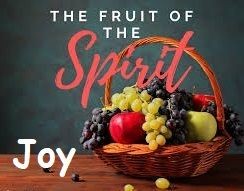The CRCA
FRUIT OF THE SPIRIT: JOY
The story is told of a retiring Supreme Court judge in the United States. He explained his choice of career by saying, ‘I might have entered the ministry if certain clergymen I knew had not looked and acted so much like dour undertakers.’ ‘Sad thing is, ordinary Christians can be also regarded as being dour and judgmental. When it comes to being ‘attractive’ people in the community that is not helpful. Our behaviour can be a stumbling block for the gospel. A joyful people, even in the worst of circumstances, can have others observing them saying, ‘We want what they have!’
When we look at the fruit of the Spirit, we see that ‘joy’ comes right after ‘love’. Love is listed first. It is key and compels us to display the other fruit in our lives. Joy comes next because it’s the first result of God’s love in our lives. Knowing God the Father loves us brings a deep sense of joy. God is the source of our joy. He, himself is filled with joy. Psalm 104 speaks of God ‘rejoicing’ over everything he has created. In the parable of the lost sheep, we read of the joy when the lost is found. Joy is a common topic in the Bible. There are 355 references to it and 77% of the Bible books make joy or rejoicing a topic of discussion. The Old Testament has four Hebrew words which are translated as joy. The meanings can be the quiet shining of the eyes, the boisterous leaping of the extraverts, the noisy exclamations of a deep felt thrill or even the funny capers that clearly show emotional delight. What is very interesting is that the Greek words for joy and grace are almost the same. ‘Charis’ is the word for ‘grace’. ‘Chara’ is the word for ‘joy’. The delightful joy in our lives, our exuberance and delight come by God’s grace through Jesus.
Now we need to be clear that ‘joy’ is not the same as ‘happiness’. The word ‘happiness’ comes from the old English word ‘happ’, which literally means ‘chance’. If things happen the way we want, then we are happy. In a poll people were asked what happiness meant to them. They listed things like being able to pay the bills, finding a mate, having children, having a good job, good health. The implication being that if these things were not ‘happening’ in their lives, they would not be ‘happy’. Some wit has said, ‘If happiness truly consisted in physical ease and freedom from care, than the happiest individual in the country would be neither a man nor a woman. It would be a cow.’ Joy, on the other hand, does not come because something is happening but arises from our faith within. Paul writes “Rejoice in the Lord always. And I say again rejoice.” Paul does not say ‘rejoice for everything.’ There is no pleasure in sickness, or job loss, or family tension. He says, “Rejoice in the Lord always.” It is not the outward happenings that determine this rejoicing. It is our inner relationship with the Lord. We rejoice “in him”. It is the relationship with Jesus that gives us pleasure and strength, even in the most difficult of circumstances.
How do we get to experience joy? It comes from rightly understanding the things the Bible teaches. Do I accept that if I put all my trust in Jesus, God looks at me as if I had never sinned, and loves me as his own child? Do I understand and accept the promises of God that he uses suffering in my life to help me grow and mature? Do I believe that when I die, I go straight home to God? Do I believe and long for the return of Christ, when all sin and suffering, war and evil will stop? Do I believe and pine for the new earth, our eternal home? Knowing these things, trusting daily in God, is what nurtures our joy. Too often we can think only in terms of being happy, hoping all our circumstances will be good. And when they are not, we sink into despair. To have joy, we don’t need some super spiritual experience. We need to get back to the Word. We need to understand more and more what God has done and has promised in his Word. As someone has put it ‘To nurture carefully the appreciation of such truths through disciplined worship and devotional exercise is to feed the soul with the fuel of joy.’ Our joy can be the most attractive thing to draw people to Jesus.
Leo Douma
When you subscribe to the blog, we will send you an e-mail when there are new updates on the site so you wouldn't miss them.


